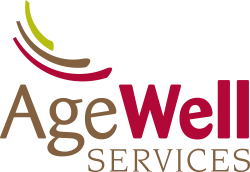For aging adults, the corrosive impact of being homebound and socially isolated can be as dangerous as smoking 15 cigarettes a day.
Health studies estimate as much as $6.7 billion in annual spending is attributed to social isolation among older adults. Among the elderly, social isolation and poor relationships were associated with a 29% increase in risk of coronary heart disease and a 32% increase in the risk of stroke.
The impact of COVID has significantly increased social isolation, particularly among the elderly. More than 56% of older adults reported feeling socially isolated in June 2020, more than double the 27% reported in 2018, according to the University of Michigan’s National Poll on Aging.
Behind these statistics are real people – with real stories.
Like Lillian and her husband, Paul, who discovered their phone wasn’t working.
“We had no way of contacting anyone for help,” Lillian explained. “What could we do?”
The next day, when their AgeWell Services Meals on Wheels delivery driver stopped by with their daily meals, Lillian shared a note with the man, who promptly called their nephew from his cell phone. Later that day, their nephew Dan fixed the phone.
“We were so thankful for our driver,” Lillian said. “We would have been stuck without his help.”
AgeWell Services’ home-delivered meals, more commonly known as Meals on Wheels, delivers nutritious meals five days a week and offers frozen weekend meals to help individuals remain independent in their own homes.
More than 60% of AgeWell Services HDM participants report their only social contact is with their delivery driver. More than simply providing nutritious food, these daily safety checks also act as lifelines to stave off the isolation of living alone.
In addition to the health impacts, isolation can make seniors more vulnerable to physical or financial abuse, according to Chris Burnaw, who manages AgeWell Service’s SafeSeniors program.
A friendly voice on the phone or what appears to be a kind face on a social media account can make an isolated senior feel less alone, she explained. Sadly, scammers know exactly what to say to create a safe space for seniors to open up with information they need in order to defraud the vulnerable senior.
Another common scam is to have a caller pose as an authority figure from a government agency with the ploy that the senior is in “trouble” or at risk of losing access to benefits. Without support from family or loved ones, the adult might not realize a scam is happening.
Isolation can also make seniors more vulnerable to traditional kinds of abuse by caregivers, including family members. Financial abuse by caretakers also may be more likely, as isolated seniors rely on others for shopping and banking errands.
As things begin to open up and in-person activities can resume safely, isolation may continue to be an issue for seniors. If anyone suspects an aging adult is being abused, call the Adult Protective Services Centralized Intake Line at 855-444-3911. The line is staffed 24/7 and reports can be made anonymously.
